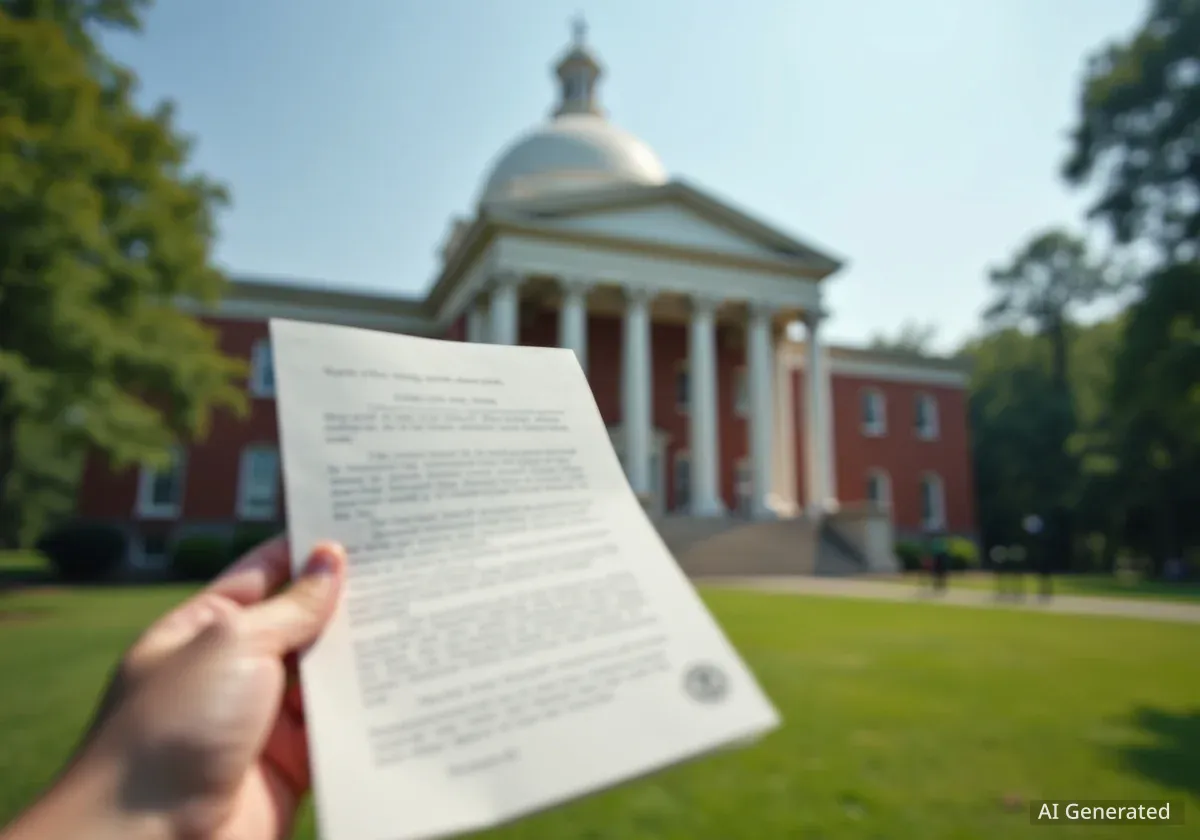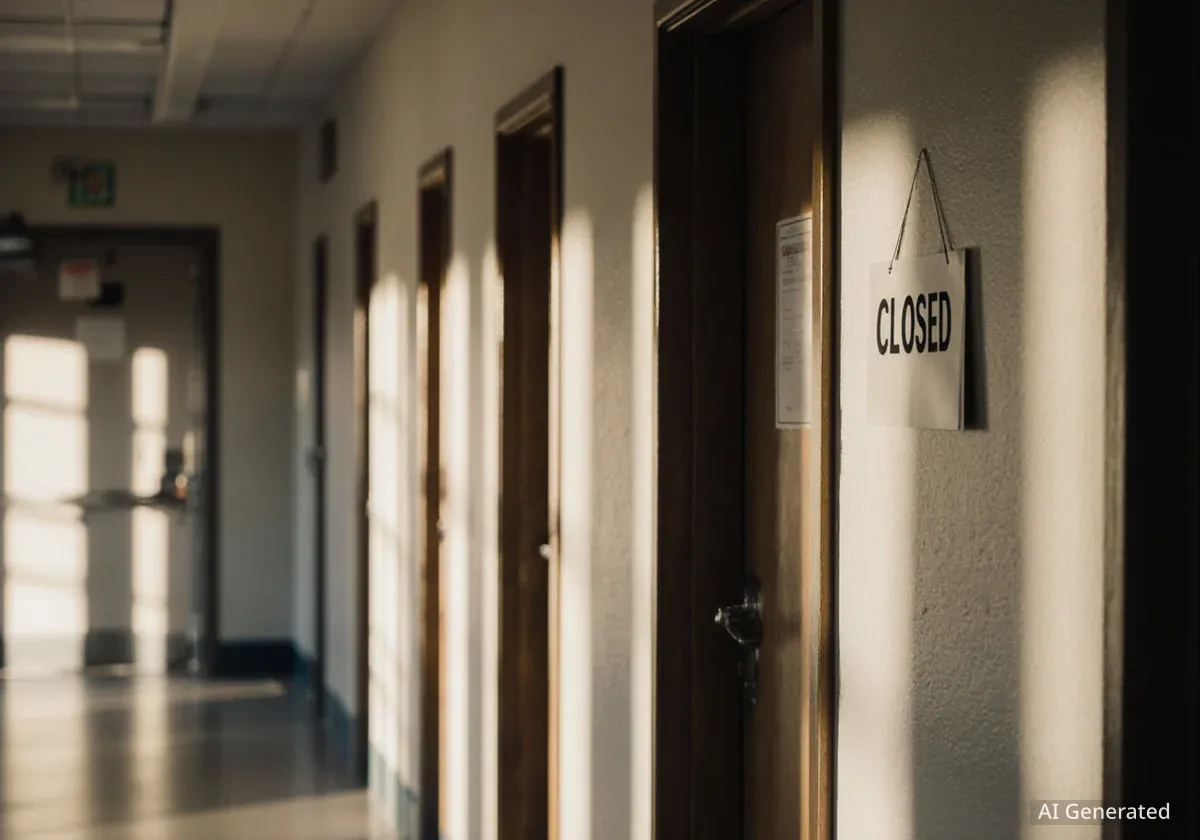The University of Virginia has formally declined to sign a controversial "compact" from the Trump administration that would have connected federal funding to significant changes in the university's policies on tuition, admissions, and hiring. The decision, announced Friday, came after extensive pressure from students, faculty, and state officials who argued the proposal threatened academic freedom.
Key Takeaways
- The University of Virginia refused to sign the "Compact for Academic Excellence in Higher Education" proposed by the Trump administration.
- University leadership stated that federal research funding must remain based on merit, not on adherence to political priorities.
- The proposal faced nearly unanimous opposition from UVA's students, faculty, staff, and various university organizations.
- The compact required a five-year tuition cap, limits on international students, and restrictions on employee political expression.
- UVA joins other major institutions like MIT, Brown, and UPenn in rejecting the agreement.
University Cites Threat to Academic Freedom
The University of Virginia's leadership concluded that accepting the terms of the compact would compromise the institution's core values. In an email to the university community, Interim President Paul Mahoney explained that the decision was rooted in the principle of merit-based funding for academic research.
Mahoney emphasized that any agreement tying financial support to conditions other than academic merit would be detrimental to the integrity of research and scholarship. He argued that such a move could undermine confidence in American higher education as a whole.
"The integrity of science and other academic work requires merit-based assessment of research and scholarship," Mahoney wrote. "A contractual arrangement predicating assessment on anything other than merit will undermine the integrity of vital, sometimes lifesaving, research and further erode confidence in American higher education."
Protecting Merit-Based Research
The administration's primary concern was that the compact would introduce political considerations into the research funding process. Currently, federal grants are typically awarded through competitive, peer-reviewed processes based on the quality and potential impact of the proposed research.
By linking funding to policy compliance, critics argued the compact would create a system where universities could be rewarded or punished based on their alignment with a specific political agenda, rather than the quality of their academic work.
Background on Federal Research Funding
Major research universities like UVA receive hundreds of millions of dollars in federal funding annually. These funds support critical research in fields ranging from medicine and engineering to social sciences. The prospect of losing this funding is a significant concern for any institution, making the decision to reject the compact a calculated risk.
Details of the Proposed Compact
The 10-page document, titled "Compact for Academic Excellence in Higher Education," was sent to UVA and eight other prominent universities earlier in the month. It outlined a series of demands that participating schools would have to meet in exchange for prioritized consideration for federal funding.
The requirements stipulated in the proposal were extensive and touched on nearly every aspect of university operations. According to reports, the key demands included:
- Tuition Freeze: A mandatory cap on tuition increases for a period of five years.
- Enrollment Limits: Restrictions on the number of international undergraduate students.
- Speech Restrictions: Prohibiting employees from expressing political views on behalf of the university.
- Policy on Conservative Ideas: A requirement to abolish any institutional units perceived to "punish, belittle, and even spark violence against conservative ideas."
These terms were framed by opponents as a direct challenge to institutional autonomy and a form of "political extortion."
Widespread Opposition on Campus and Beyond
The proposal was met with swift and unified opposition from virtually every corner of the UVA community. Prior to the official decision, numerous influential groups on campus passed resolutions or issued statements calling for the university to reject the offer.
Among the organizations that formally opposed the compact were the Student Council, the Faculty Senate, the Staff Senate, the School of Law, the School of Nursing, and the UVA chapter of the American Association of University Professors (AAUP). The Wahoo's@UVA alumni association and the United Campus Workers union also joined the chorus of dissent.
A Unified Front
Even the Jefferson Council, a conservative alumni association that often aligns with Trump administration priorities, expressed doubts about the compact and did not endorse it, highlighting the unusually broad consensus against the proposal.
Student and Faculty Protests
Just hours before the decision was announced, hundreds of students, faculty, and staff gathered on the university's historic Lawn to protest the compact. Speakers at the rally urged the administration to stand firm against what they described as an attack on academic principles.
Student Council President Clay Dickerson delivered a passionate speech from the steps of the Rotunda, a building designed by university founder Thomas Jefferson.
"We are not a dog. We are not to be leashed up by the federal government and dragged around where they want to take us," Dickerson said. "We will take ourselves where we want to go — because we are UVA."
Walt Heinecke, a professor and past president of the UVA chapter of the AAUP, called the proposal an "unprecedented federal intrusion into institutional autonomy and academic freedom."
Political and Legal Implications
The controversy also drew the attention of state lawmakers, who warned of serious repercussions if UVA were to accept the federal government's terms. Virginia Senate Majority Leader Scott Surovell (D-Fairfax) spoke at the protest, stating that the state's General Assembly would not support an institution that ceded its authority.
"If the Board of Visitors decides to sign the silly compact, there will be consequences in Richmond," Surovell warned. "The General Assembly will not tolerate our taxpayer dollars... to subsidize an institution ceding its control to President Trump."
Furthermore, faculty groups prepared for potential legal challenges. Professor Heinecke confirmed that the AAUP chapter had been consulting with a pro bono law firm to explore options if the university's funding was threatened by the administration's rejection of the compact.
Other Universities Respond
UVA is not alone in its decision. Several other institutions that received the proposal, including the Massachusetts Institute of Technology (MIT), Brown University, the University of Pennsylvania, and the University of Southern California, have also declined to sign.
A few universities, including Vanderbilt University and the University of Texas at Austin, have until November 21 to make their decision. The White House has reportedly been meeting with colleges still weighing the agreement.
In his closing remarks, President Mahoney left the door open for future collaboration with the federal government on improving higher education but stressed it must be through a different, more collaborative approach.





